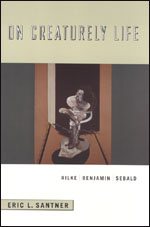Review: Santner, On Creaturely Life
 Eric Santner’s new book On Creaturely Life: Rilke, Benjamin, Sebald, recently received an enthusiastic review by Ross Wilson in the Times Literary Supplement. Wilson’s review begins:
Eric Santner’s new book On Creaturely Life: Rilke, Benjamin, Sebald, recently received an enthusiastic review by Ross Wilson in the Times Literary Supplement. Wilson’s review begins:
What is life? What kind of beings are human beings? Despite their forbidding enormity, these questions have received sustained scrutiny in contemporary political theory, philosophy, literary theory, and criticism.… Eric L. Santner’s fascinating, difficult book is a significant contribution to this attempt to specify what is human about human life and, indeed, what is meant by “life” to begin with.
Ross not only praises Santner’s book as “the most urgently relevant sort of intellectual history” but explains its relation to the work of the Italian philosopher Giorgio Agamben, and provides a lucid gloss of its main arguments:
“Creaturely life” is not simple biological life, then, but the “zero degree of social existence”; it is that minimum of human life, closest to animal life, which is caught up in the antagonisms of the political.”
Two years ago we posted an essay by Santner that offered a highly topical rehearsal of these ideas—an account of Terry Schiavo and Abu Ghraib as “two faces of the state of exception in which political power takes a direct hold on human life.”
As Ross notes in his review, Santner’s new book not only extends his earlier work on political theology, but shows how the great novelist W. G. Sebald “in particular, and literature in general, are especially suited to documenting the nature of creaturely life.”